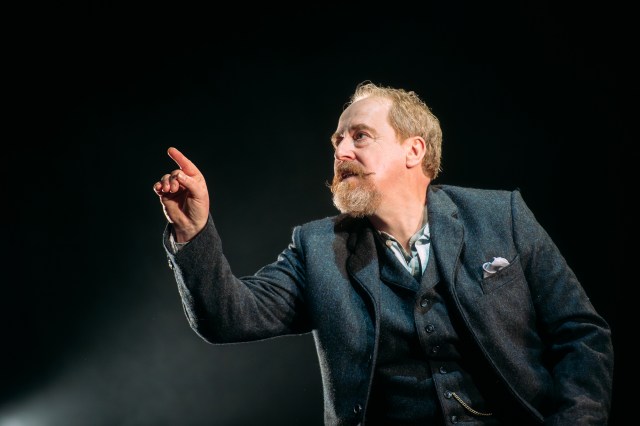Jekyll and Hyde at the Royal Lyceum Theatre – review
The Forbes Masson-led solo show runs until 27 January

Jekyll and Hyde may be set in London, but its origins (and its author) are steeped in Edinburgh, so watching it at the Royal Lyceum feels almost like a homecoming, particularly when you’re being taken through it by an actor as versatile as Forbes Masson.
He’s the only person on stage in Gary McNair’s one-man adaptation, but you always feel like you’re in the safest of hands as he takes you through Robert Louis Stephenson’s story of the duality of good and evil in all of us. Masson’s is a winningly mellifluous voice to spend 80 minutes with, and he brings the story to life with beauty and insight. He’s helped in that by McNair’s language and by Michael Fentiman’s direction. Every scene unfolds with directness and clarity, allowing it to come to vigorous life. Some moments, such as the scene where Hyde tramples on the little girl, are far more gripping than in the novel because of the directness of the communication that you find in both McNair’s text and Masson’s delivery. That means that the two occasions when the F-word is used feel gratuitous and unnecessary: there’s already plenty of tension in the unfolding story without that.
Masson mostly plays the role of the novel’s narrator, Mr Utterson, but the device of the play requires him to slip into several other characters, each of which is carefully delineated, partly by Masson’s mannerisms and voices, and partly by Max Jones’ minimalist set design. It isn’t much more than a black box with a few bulbs, but these are used cleverly to heighten the narrative tension at key moments, such as picking out the door to Hyde’s house. More importantly, the set mirrors the novel’s balance of darkness and light, and it helps the separation of characters with flashbulb effects and the occasional ominous rumble from Richard Hammarton’s sound design. The only character who comes off less successfully is Jekyll himself. He doesn’t get to speak directly until halfway through the play but, when he does, the neat touches that delineate the other characters are abandoned for the rather banal device of swapping a bowler hat between Masson’s two hands, as though they had run out of ideas by then.
McNair doesn’t manage to solve the problem of the story’s ending. The novel’s power is supposed to derive from the shock revelation that Jekyll and Hyde are the same person, but how do you deal with that when we all know the secret already? His answer is partly successful, though a bit too neat (and I won’t spoil it here). There’s even an attempt to implicate the audience, though it doesn’t quite fit the contours of the story as we’ve witnessed it up to that point.
It doesn’t detract from the play’s overall impact, though. It’s compelling as a piece of pure theatre: one man, one voice and the taut power of language. That’s really all you need when it’s done well.
















